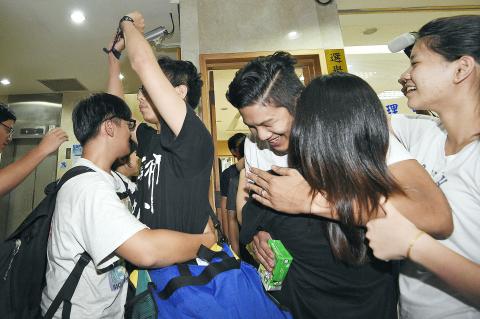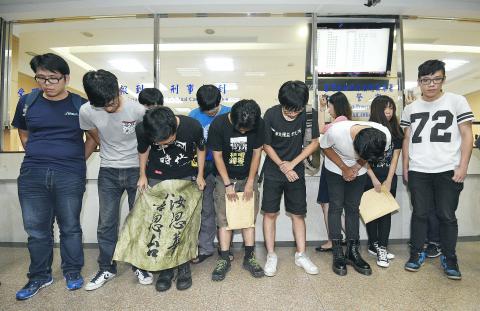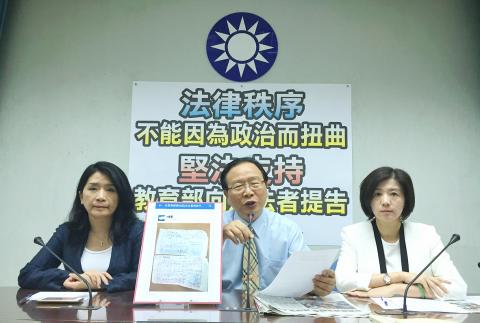The Democratic Progressive Party (DPP) yesterday said legal action by the Ministry of Education against students is a “big joke,” after a group broke into the ministry building late on Thursday night in a protest over proposed adjustments to high-school curriculum guidelines.
“The ministry broke the law with the proposed curriculum guidelines, and now it is bringing legal action against students,” DPP spokesperson Huang Di-ying (黃帝穎) said. “If Minister of Education Wu Se-hwa (吳思華) does not withdraw the action against the students, he will destroy his image and blight his conscience, becoming a dirty politician with a bad name that will follow him for the rest of his life.”
Thirty-three people, including three journalists, were detained by police after they entered the building. The protesters were released late on Friday after posting bail ranging from NT$10,000 to NT$30,000. The journalists were placed under house arrest after each refused to pay NT$10,000 bail.

Photo: Chen Chih-chu, Taipei Times
DPP Chairperson Tsai Ing-wen (蔡英文) yesterday reiterated DPP demands that the ministry halt its plan to implement the curriculum guidelines by next month, adding that the ministry should withdraw its legal action against the protesters and the journalists.
“The ministry has set a poor example by threatening legal action against students and journalists,” she added.
The Chinese Nationalist Party (KMT) caucus expressed its support for the ministry’s actions.

Photo: Chen Chih-chu, Taipei Times
“The protesting students stormed into the minister’s office and occupied it,” the caucus said. “The law cannot be distorted by politics, so we firmly stand with the ministry’s decision to bring charges against any who breach the law.”
KMT Legislator Lin Te-fu (林德福) displayed a photograph that has been circulating online, showing a receipt for NT$1,495 worth of umbrellas, suggesting that the DPP had made the purchase.
Lin said the DPP likely masterminded the break-in, accusing the party of instigating students and at the same time releasing a joint statement urging the ministry to withdraw its legal challenge.

Photo: CNA
Lin said Tsai, as a legal scholar and presidential candidate, “has unscrupulously used the situation for her own political interests and flagrantly showed contempt for the nation’s laws.”
KMT Legislator Lee Guei-min (李貴敏) said that a party with opinions about the curriculum guidelines should propose its ideas in the legislature, not push young people who have little understanding of the law to the front lines, presenting them with the opportunity to destroy the rule of law and democracy.
Lee, who has a background in law, said the protesters’ actions constituted an “intrusion” according to the Criminal Code, so “if the ministry fails to take legal action, it would be tantamount to saying that similar actions are legally permitted.”
However, Lee said freedom of the press should be protected and questions over whether the journalists arrested had breached any laws needed further investigation.
KMT presidential candidate Hung Hsiu-chu (洪秀柱) called on “the party behind the protests” to “get its hands off” young people.
“The political party behind” the protesters’ actions should not “hide behind protesting young people,” which is unthinkable in a democratic nation, Hung said.
Tsai said Hung should exercise caution when speaking and refrain from twisting the facts.
“The real cause of the problem is the mishandling — by the government, and especially the ministry — of the curriculum adjustment plan, which triggered hostility and disputes,” Tsai said.

NATIONAL SECURITY THREAT: An official said that Guan Guan’s comments had gone beyond the threshold of free speech, as she advocated for the destruction of the ROC China-born media influencer Guan Guan’s (關關) residency permit has been revoked for repeatedly posting pro-China content that threatens national security, the National Immigration Agency said yesterday. Guan Guan has said many controversial things in her videos posted to Douyin (抖音), including “the red flag will soon be painted all over Taiwan” and “Taiwan is an inseparable part of China,” while expressing hope for expedited “reunification.” The agency received multiple reports alleging that Guan Guan had advocated for armed reunification last year. After investigating, the agency last month issued a notice requiring her to appear and account for her actions. Guan Guan appeared as required,

Japan and the Philippines yesterday signed a defense pact that would allow the tax-free provision of ammunition, fuel, food and other necessities when their forces stage joint training to boost deterrence against China’s growing aggression in the region and to bolster their preparation for natural disasters. Japan has faced increasing political, trade and security tensions with China, which was angered by Japanese Prime Minister Sanae Takaichi’s remark that a Chinese attack on Taiwan would be a survival-threatening situation for Japan, triggering a military response. Japan and the Philippines have also had separate territorial conflicts with Beijing in the East and South China

A strong cold air mass is expected to arrive tonight, bringing a change in weather and a drop in temperature, the Central Weather Administration (CWA) said. The coldest time would be early on Thursday morning, with temperatures in some areas dipping as low as 8°C, it said. Daytime highs yesterday were 22°C to 24°C in northern and eastern Taiwan, and about 25°C to 28°C in the central and southern regions, it said. However, nighttime lows would dip to about 15°C to 16°C in central and northern Taiwan as well as the northeast, and 17°C to 19°C elsewhere, it said. Tropical Storm Nokaen, currently

PAPERS, PLEASE: The gang exploited the high value of the passports, selling them at inflated prices to Chinese buyers, who would treat them as ‘invisibility cloaks’ The Yilan District Court has handed four members of a syndicate prison terms ranging from one year and two months to two years and two months for their involvement in a scheme to purchase Taiwanese passports and resell them abroad at a massive markup. A Chinese human smuggling syndicate purchased Taiwanese passports through local criminal networks, exploiting the passports’ visa-free travel privileges to turn a profit of more than 20 times the original price, the court said. Such criminal organizations enable people to impersonate Taiwanese when entering and exiting Taiwan and other countries, undermining social order and the credibility of the nation’s